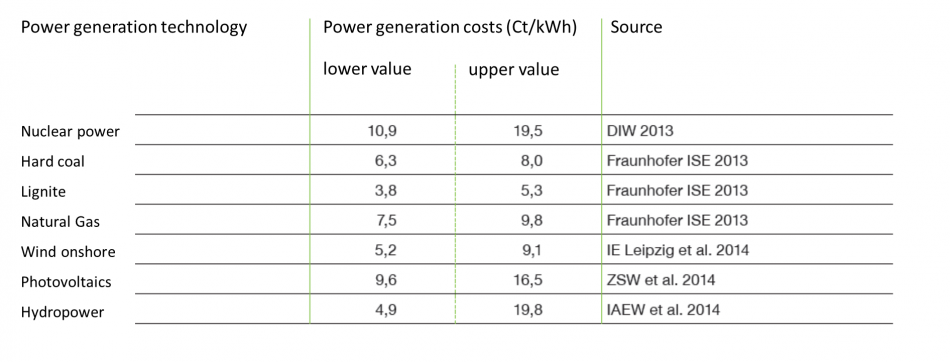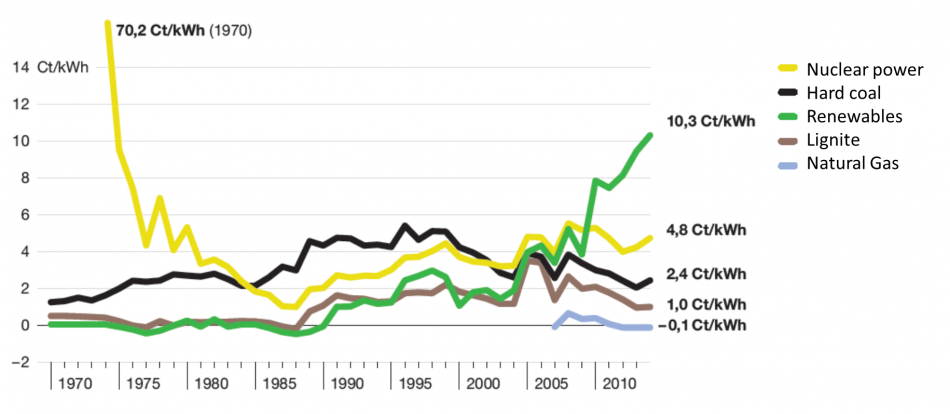In the media: Merkel sceptical of capacity markets; study on real cost of electricity
Reuters
"Merkel dashes loss-making power plants' aid hopes"
Chancellor Angela Merkel said she was sceptical about capacity markets that would give extensive support to old coal fired power stations, Reuters reports. Merkel said at a reception of the German Renewable Energy Federation (BEE) that there was obviously a need for power in times of little sun and wind but that for climate protection reasons, comprehensive subsidies to coal and gas powered stations were not the solution. Merkel acknowledged the thermal plant producers' concerns but this could not mean helping plants with high emissions survive under Germany's climate protection targets, Reuters writes. The Ministry for Energy and Economic Affairs is due to present legislation on a new power market design later this year.
Merkel also said grid expansion to bring wind power from the north to the industrial centres in west and south Germany was a high priority, the article says.
See the article in English here.
See the Clean Energy Wire's dossier on future power market design here.
Klimaretter.info
“Angela Merkel’s fight for applause”
Germany’s Chancellor Angela Merkel faced a tough crowd at yesterday evenening’s BEE conference, Nick Reimer reports on Klimaretter.info. While BEE president Fritz Brickwedde's warning against a few big players taking over Germany’s renewable power production if competitive bidding replaces feed-in traffis was well received, Merkel failed raise applause with her assurance that this would not happen. Only when Merkel confused kilowatt-hours with kilocalories did the audience applaud her witty apology, Reimer writes. When the chancellor called the downturn in development of photovoltaics a “breather” the crowd protested.
See the article in German here.
Greenpeace Energy
“What electricity really costs: Hidden costs of coal and nuclear almost twice as high as EEG surcharge”
Greenpeace Energy have commissioned a study by Green Budget Germany calculating that the hidden costs of nuclear and fossil fuel power are equivalent to 11 euro cents per hour (see table below) – almost twice what consumers pay to fund the development of renewables through the EEG surcharge. The study took into account government subsidies and financial incentives (see figure below), as well as the costs of environmental damage and nuclear waste disposal, amounting to 40 billion euros per year over the last two years. Greenpeace says that while renewables are becoming increaisngly competative, conventional power plants struggle to cover their costs.
"Renewable energy is not only clean, but the bottom line is, it is much less expensive than coal and nuclear," says Marcel Keiffenheim, head of policy and communications at Greenpeace Energy. "The problem is that the high cost of coal and nuclear power are hidden from the customer and paid indirectly through taxes and duties.”
Download the Greenpeace study in German here.
Kölnische Rundschau
“Interview with RWE Power head Matthias Hartung: We go our own way”
In an interview for the Kölnische Rundschau RWE Power’s CEO said the company has no plans to follow competitor E.ON's lead and spin off conventional power generation. Hartung told the newspaper that the effect of renewable development in driving down the market power price hit RWE hard. He went on to say that he believes “the realization that we need a capacity market will prevail politically,” and that the entire industry supports the model of a non-discriminatory decentralised capacity market.
See the article in German here.
Die Zeit
“Driving cars is far too cheap”
“If we don’t change something, the energy transition will fail because of the amount of cars we have,” Andreas Knie, transport expert at research institute InnoZ in Berlin told Die Zeit in an interview. Within a few years, transport will account for half of energy usage, Knie said. He calls for a "transport transition" including fewer cars in cities, more car-sharing and a public transport networks. So far, this transition has failed because politicians are not brave enough, Knie said.
Renewables International
"Was 2014 the turning point for Germany’s Energiewende?"
Writing for Renewables International, Craig Morris says views that 2014 was a turning point for the energy transition is “imprudent” and a cold spell in 2015 could see carbon emissions rise again. Morris also questions predictions that energy exports have reached a peak, and says additional renewable capacity will only just cover the shortfall from the Grafenrheinfeld nuclear power plant going offline this year - and depends on fluctuating supply.
See the article in English here.
See a Clean Energy Wire stories on the 2014 data here and here.


